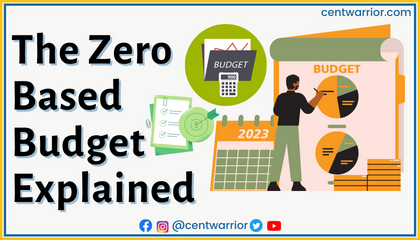A lot goes into making a working budget. You’ve to ensure your account for every coin you make before you start spending, and that’s where Zero Based Budgeting (ZBB), sometimes known as Zero Sum Budgeting, comes in.
This budgeting method dictates you assign a job to every shilling and cent on your paycheck. Ultimately, your take-home income (including bonuses) minus your monthly expenses (and savings) should equal zero.
If it doesn’t, you’ll have to adjust something, more often an expense, until it does. So, before you can start spending your monthly income, you already know how you’ll do it, and that’s where the issue of accountability comes into the picture.
Overall, so much goes into making a working ZBB budget, which I’ll share. And as you’ll realize, it doesn’t suit everyone. So, there are pros and cons which you should be wary of beforehand that I’ll also share.

Here’s what to expect to learn about this budgeting system:
- What’s a Zero-Based Budget?
- What’s a Zero-Based Budget for?
- How do you do Zero Budget Budgeting?
- An example of a Zero Based Budget
- Zero-based budgeting pros and cons
- Zero Budget Vs. 50/30/20 Rule
- Is Zero-Based Budgeting good?
Let’s jump into it!
What Is Zero Based Budgeting?
Zero Based Budgeting is a budgeting method that requires you to give a job for every shilling and cent you make. With it, you spread your income across expenses, savings, investments, debt repayments, and every other category that requires you to spend money.
At no particular time does any of your shilling lack a purpose. And when you deduct the expenses from the take-home, the difference should be zero.
Here’s a simple formula for making a Zero Based Budget, also known as a Zero-Sum Budget:
All income (after tax income + bonuses) – All expenses (fixed & variable +savings) = Zero
Who’s Zero Based Budgeting for?
Generally, a Zero Based Budget is good for you if:
- You are very new to personal budgeting – a ZBB works best for guys who’ve never budgeted or are in the early stages because it’s pretty straightforward. All you’ve to do is ensure you give a job to every coin you make, and the difference between take-home income and expenses should be zero.
- You want to give a job to every coin you make (stay accountable) – It’s not easy to account for every coin you make without a budget, but a ZBB makes that possible.
- You’ve short-term money goals – If you want to achieve a particular financial goal in a month or two, a ZBB can help you. Whether starting an emergency fund, tackling debt, or taking up a new personal finance course, you can create a room with ZBB.
- You don’t like restrictive category budgeting – If you don’t like anyone to dictate how much to spend (in terms of percentage) on a given category, such as needs, wants, and savings, ZBB will work for you.
- You usually have dissimilar money goals every upcoming period – If you often have a different financial goal every month or after every three months, ZBB will work for you. It allows you to make adjustments every month to suit your money goals.
How to Do Zero Based Budgeting
Before I can explain the ZBB process, let me clarify what needs to go in the income and expenses section so that you can balance the two.
The income section on the left of your spreadsheet should include the following:
- Salary or wages (take-home pay)
- Commissions
- bonuses/money gifts
- Pocket money
- Interests earned
- Investments payouts
- Government payments

The expenses section, on the other hand, features these five sections:
- Needs – They include rent/mortgage, transport, food, groceries, household products, medication, insurance, utility bills (electricity, gas, water, and phone/internet costs), and loan repayments
- Wants – Includes new clothes, dine-outs, subscriptions, hobbies, entertainment, memberships, travel, dates, and vacations.
- Savings – Includes an emergency fund, sinking funds, college fund, and retirement contribution, among others
- Investments – This could be anything like buying a home, real estate, stocks, or starting a business.
- Charity giving – If you are philanthropic, which you should be, you should include your 10% contributions.
Zero-Based Budgeting Process
Now that you know what goes into the income and expense sections, let’s discuss the process. Here are the critical steps for setting up a Zero-Sum Budget:
Step 1 – Calculate Your Monthly Income
Remember, we are not just talking about your salary or wages after basic deductions like tax and NHIF. We also discuss add-ons like commissions, bonuses, interests, government payments, and investment dividends.
Add everything up and note the amount down.
Step 2 – Determine Your Total Expenses
Refer to the five categories (needs, wants, savings, investments, and giving) I shared earlier to determine your total expense. Yes, some expenses, such as food, utility bills, and groceries, are variable, but you still have to include them.
Step 3 – Get the Difference Between Income and Expenses
The objective is for the income to balance with the expenses. You should be able to get zero when you deduct the expenses from your income.
Step 4 – Adjust Your Expenses
You are less likely to get a zero on your first attempt at creating a Zero Based Budget. That means you must adjust your expenses.
It’s usually easy when the income exceeds expenses since you can stash the extra money into savings. The challenge is when your expenses are more than your income, which requires you to adjust them.
See what you can cut out and try not to touch your financial goals (savings, charity, and investment) as much as possible.

Zero Based Budgeting Example
Let’s look at a Zero Based Budget of someone earning the national average monthly salary of Ksh 20,123. If so, then such a person can have this kind of Zero Based Budget:
| Income | Expenses |
| Paycheck – Ksh 20,123 Side hustles – Ksh 20,000 Other earnings – Ksh 5,000 | Rent – Ksh 8,000 Food/Groceries – Ksh 8,000 Utilities – Ksh 3,000 Transport — Ksh 2,000 Giving — Ksh 4,512.30 Savings – Ksh 9,000 Insurance – Ksh 2,000 Extras (Fun Money) – Ksh 5,000 Miscellaneous – Ksh 5,000 |
| Total = Ksh 45,123 | Total = Ksh 45,123 |
Zero-Based Budgeting Advantages and Disadvantages
Benefits of Zero Based Budgeting
Here are zero based budgeting benefits:
- Accountability – A Zero Sum Budget gives every cent a job, making it easy for you to account for every income you receive.
- Simplicity and efficiency – A Zero Sum Budget is simple to set up as all you must do to balance expenses with income. But even better, you can efficiently run it to attain your financial goals.
- Compatibility – A Zero Based Budget is flexible enough to combine with other budgeting methods, especially percentage-based budgeting formulas like the 50/30/20 Rule. That allows you to budget for the short term and the long term.
- Cost reduction – Since everything has to balance, a Zero Based Budget enables you to reduce some costs and expenses which may not be necessary and even save more in the long run.
- Live within your means – Since your expenses equal your income, ZBB allows you to live with what you can afford.
- Customizable – A Zero Based Budget allows you to adjust your expenses based on your income and financial priority. It will enable you achieve goals like paying off debt first and saving for an emergency fund before investing.
- Shows where to improve – If your income is more than your expenses, ZBB tells you that you should probably save or invest more, and if it’s the opposite, then you should cut down on some costs or learn more.
Disadvantages of Zero Based Budgeting
Here are zero based budgeting disadvantages:
- It doesn’t specify the categories to spend money – Given that a Zero Based Budget only indicates that the expenses should match the income, it doesn’t specify how much to spend on the costs. That is unlike a percentile method like the 50/30/20 Rule, which dictates what percentage of your income to allocate to needs, wants, and financial goals.
- It can be time-consuming – A Zero Based Budget requires you to build it from scratch, which you may have to regularly do if your income is irregular or you get bonuses and commission. That can take much time.
- Not ideal for unpredictable income – ZBB only works best when you have a predictable monthly income. That means it might be challenging if you are a contract worker or freelancer who only gets paid when there’s a gig; a zero-based budget may not be the best choice.

Zero-Based Budgeting Vs. 50/30/20 Rule
The 50/30/20 Budgeting Rule is one of the Zero Based Budgeting alternatives. Unlike ZBB, the 50/30/20 Rule is based on a percentage split of your income where:
- 50% of after-tax pays for the needs
- 30% pays for the wants
- 20% takes care of your financial goals (Investments, debt payments, savings, and so on)
Ideally, we recommend the Zero-Based Budget because, unlike the 50/30/20 Rule, which focuses less on money goals, a Zero-Based Budget is easily customizable to match your money goals at any specific financial stage.
Also, unlike the 50/30/20 Rule, which only allows you to pay the minimum debt payment, ZBB enables you to pay your debt much quicker as you get to treat that as a financial goal.
Besides, ZBB changes with your income and goals, which you cannot say about the 50/30/20 rule or any other percentage-based budgeting system.
Is Zero Based Budgeting Good? Closing Thought:
If you want to achieve a short-term financial goal, account for every shilling you make, revise your money goals periodically, or are very new to personal budgeting, a Zero Based Budget is good for you.
You can use it alone or combine it with an option like the 50/30/20 Rule or Cash Envelope System. And if you have difficulty integrating the two, talk to our team on socal media. We can help you learn how to budget better and enjoy financial freedom.
Also Read:







